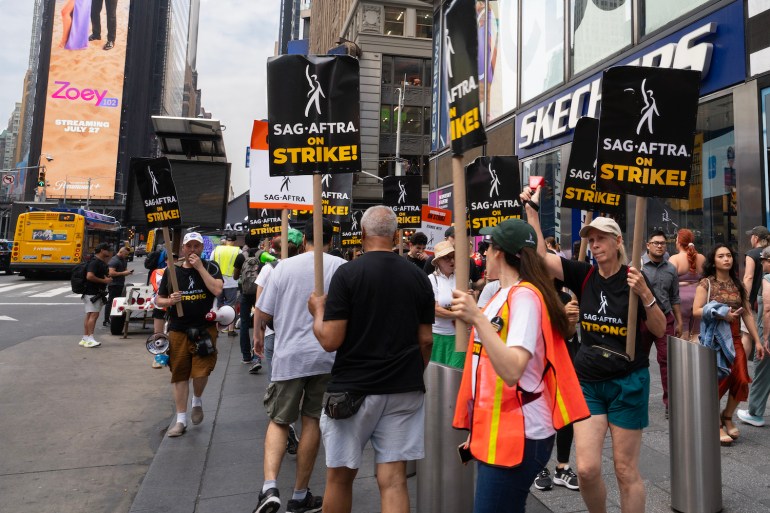Productions are preparing to welcome back actors from the picket line after the Screen Actors Guild – American Federation of Television and Radio Artists (SAG-AFTRA) reached a tentative agreement with the studios, bringing an end to 118 days of strike action.
In a statement made to US media, SAG-AFTRA said the strike had ended after its negotiating committee approved the deal from the Alliance of Motion Picture and Television Producers (AMPTP) in a unanimous vote on Wednesday afternoon US time.
The agreement next goes to the SAG-AFTRA national board for approval on Friday, after which the details will be released.
The provisions regarding AI were reportedly the final hurdle in the negotiations after the AMPTP issued its “last, best, and final” at the end of last week.
On Monday afternoon US time, the union issued a statement saying there were “several essential items on which they did not have an agreement, including AI, with Variety reporting yesterday the studios had agreed to adjust their language on the issue in order to hammer out a deal.
In announcing the tentative agreement, SAG-AFTRA said they had achieved a deal that includes “above-pattern minimum compensation increases, unprecedented provisions for consent and compensation that will protect members from the threat of AI, and for the first time establishes a streaming participation bonus”.
“Our pension and health caps have been substantially raised, which will bring much-needed value to our plans. In addition, the deal includes numerous improvements for multiple categories including outsize compensation increases for background performers, and critical contract provisions protecting diverse communities” it said.
It concludes the longest strike in SAG-AFTRA history, with the industrial action commencing July 14 in concurrence with the writers’ strike, which has since ended. The dispute meant members were not able to work on film or television productions, or promote projects through attending premieres or film festivals, conducting interviews, or via social media.
In Australia, production on Universal’s Apples Never Fall, a series adaptation of Liane Moriarty’s novel, was placed on hiatus in Queensland with crew stood down without pay. In September, NBCUniversal said it was looking forward to getting back work on the project while emphasising its commitment to “ongoing investment in Australian production, infrastructure, and training”.
Mortal Kombat 2, which is being made on the Gold Coast at Village Roadshow Studios, was also suspended due to the industrial action, but resumed on November 16.
Australia’s Media Entertainment and Arts Alliance published an open letter from the crew of Apples Never Fall, in which the studio was called on to provide compensation to those they had terminated.
Speaking to IF on Friday MEAA equity director Michelle Rae congratulated SAG-AFTRA members for “standing together and taking collective action in the face of pressure from some of the most powerful corporations on the planet”.
“This strike was important not only for actors in the US, but all around the world,” she said.
“The issues that SAG-AFTRA members went on strike over – including fair compensation from streaming services and constraints around the use of Artificial Intelligence – are universal for actors around the world.
“Not only does the new Hollywood deal prevent studios from using an actor’s identity without proper consent and compensation, but it will spread the massive revenues of streaming services more equitably.
“The duration of the strike has been tough for those Australian performers and crew who had been stood down because some offshore productions were suspended here, but local screen workers have always recognised they are in a shared struggle with their US counterparts, and have stood in solidarity with them.”


